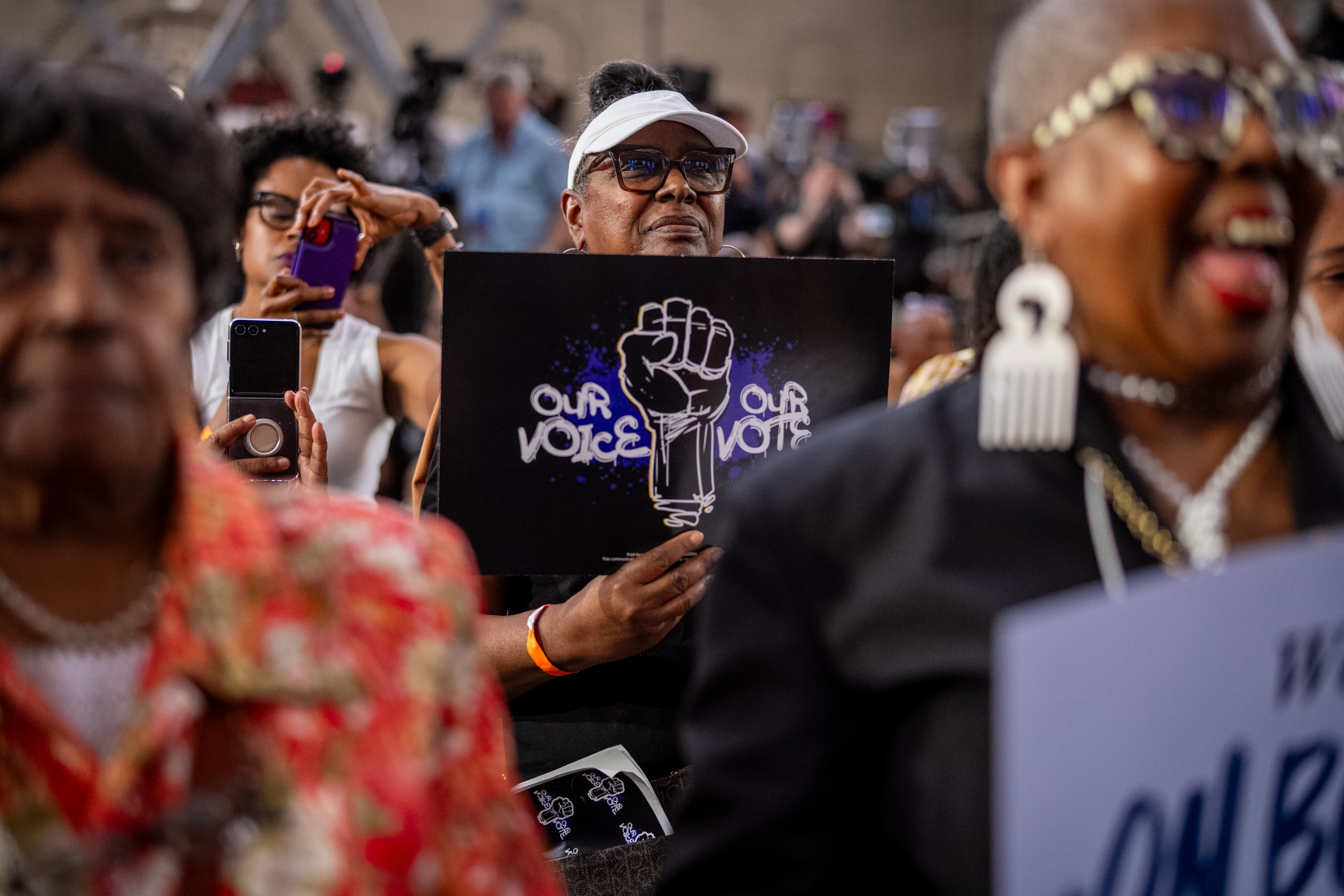
In recent years, research has consistently shown Black Americans becoming less religious. In a 2023 Pew poll, 72 percent of Black people identified as Christian, with 24 percent identifying as religiously unaffiliated. Just a decade earlier in 2013, 79 percent identified as Christian and 16 percent identified as religiously unaffiliated. For political epidemiologists like myself who study the psychology of voters, religion frequently represents a “sleeper” variable in how we think about the Black vote. At first glance, these transitions seem to hint that Black people are poised to move deeper into the Democratic Party‘s progressive wing. Another possibility? They’re experience a deepening disillusionment with the pace of racial progress and with the Democratic Party which, according to a new NBC News poll, only a dismal 27 percent of registered voters currently have a positive view of.
For many Black Americans, their Christian faith is not only a key dimension of their identity; it rivals the importance of their national and racial identities and is in fact intertwined with them. Surprisingly, unlike white Christians who tend to hew Republican, Black Christians are no more likely to be Democrats or Republicans. This adds an extra level of nuance to forecasts on how the Black vote will look in the future. The United States Census Bureau predicts a 41.1 percent increase in the size of the nation’s Black population by 2060. That’s no small bump in a country where state electoral outcomes frequently rest on a margin of just 1 or 2 percentage points. (In contrast, the non-Hispanic white population is expected to decrease by 9.5 percent during this period.)
Andrew Harnik/Getty Images
Before he was a civil rights leader, Martin Luther King Jr. was an ordained Baptist minister and often used Christian dogma to both strengthen Black Americans’ resolve and lure white Christians toward the civil rights cause. King’s comparatively easygoing approach, forged by Christian virtues, rubbed some Black leaders the wrong way. He was often ridiculed by contemporaries, including renowned adherents of the Nation of Islam such as Malcolm X and Muhammad Ali, as being too actively focused on integration and too passively focused on Black empowerment, critiques of the Black political establishment that persist today.
The reason for the apparent deepening of this attitude is multifaceted, but it primarily reflects a metamorphosis in how Black people have come to see complex topics like free will and fate in the 21st Century—attitudes forged by a tacit reckoning with their ancestors’ experiences. During slavery, many enslaved Africans willingly embraced Christian teachings and the spoils that the Christian faith seemed to offer. Others resisted Christianity, as, at best, an insufficient replacement for their traditional African religion and a tool of white domination. And still others were coaxed into Christendom, forced into routine prayer, church attendance, and adherence to other Christian tenets. Despite the uneven beginnings, Christianity eventually blossomed into an all-encompassing source of respite and hope for enslaved people and their descendants.
As social and economic progress has ebbed and flowed for Black Americans though, their confidence in organized religion has dissipated. And some have taken notice. In the 2024 presidential election, President Donald Trump made modest but notable inroads with Black male voters. Prior to his win, he attended a Black church in Detroit, as he had done in his 2016 run. His message to attendees (and to Black America more broadly) was decidedly not centered on religious appeals—like messages he crafted for other voting blocs—but rather on economic opportunity and community safety. Trump tapped into something—Black people no longer see their fortunes as being so intimately linked to external factors—government and religion included. The political consequences of this are stark.
A 2019 Pew poll showed that only 29 percent of Black Democrats identified as liberal. Compare that to the 37 percent of Hispanic Democrats, and 55 percent of white Democrats who considered themselves liberal. Then take abortion, long a flashpoint in the discussion of religion and politics, with most mainstream Christian movements in steadfast opposition. Between 2001-2007, 31 percent of Black Americans considered abortion to be morally acceptable. Between 2017-2020, that number jumped to 46 percent. While much of this change is driven by younger Black people, the bigger observation is that political identity is perhaps becoming an insufficient predictor of certain groups’ feelings on key cultural issues.
Conventional wisdom holds that people tend to get more religious over time. However, compared to older generations, young Black adults are growing more liberal on not just issues like abortion, but LGBTQ rights and climate change, putting them further at odds with both their elders’ trajectories and the traditional Black Christian ethos. As attacks on reproductive rights and other social justice issues continue unabated, this trend is likely to grow and deepen Black America’s schism with the Black church. Black Churches—and Democratic politicians alike—will need to adjust to these nuances to maintain a relevant foothold with the people it helped plant a political foundation for.
Jerel Ezell is an assistant professor and political epidemiologist in community health sciences at the University of California Berkeley. He studies the cultural aspects of policy and health.
The views expressed in this article are the writer’s own.
